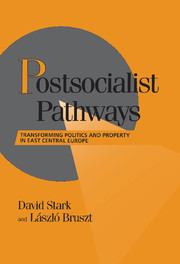Summary
SIMULTANEITY
Can the transformation of property regimes and the extension of citizenship rights be achieved simultaneously? This is the postsocialist challenge. Can the governments of postsocialist Eastern Europe successfully pursue economic reform when the citizens who bear its costs acquire the means to replace political incumbents and choose among competing political programs? This is the postsocialist experiment. The concurrent transformation of property and politics in postcommunist societies is occurring, moreover, in the context of a contracting world economy, thereby dramatically increasing the social burdens caused by economic restructuring. The simultaneous emergence of newly propertied classes and newly enfranchised subordinate groups poses the central postsocialist problem of how to restructure economies when those who perceive their interests to be threatened by economic change have the capacity to block the implementation and consolidation of reforms.
The twinned expansion of property rights and citizenship rights requires a twinned scholarship. This volume presents the results of our collaborative efforts, as an American economic sociologist and a Hungarian political scientist, to study the dual transformations of the polities and economies of Eastern Europe, not simply as parallel but also as interacting processes.
The more systematically we examined the ways in which the various East Central European societies are struggling with the dilemmas posed by the simultaneous attempts to transform politics and property, the more we became aware of the rich organizational innovations that are taking place in postsocialism. Told by many that their best strategy was to imitate the tried and proven institutions of Western Europe and North America, the political and economic actors of postsocialism faced distinctive challenges that made it impossible simply to imitate - even where their initial selfconceptions were not as innovators. “Instant,” “Xerox,” or “copycat” capitalism was not a possibility, if for no other reason than that the institutions for transforming property regimes could not be identical to those of already established orders. Told by some that their best strategy was to choose between democratization and marketization — that they could do one or the other but not both — the politicians and publics of East Central Europe rejected the idea that the legacies of state socialism condemn them either to authoritarianism or to economic backwardness, if not both.
- Type
- Chapter
- Information
- Postsocialist Pathways , pp. 1 - 12Publisher: Cambridge University PressPrint publication year: 1998



